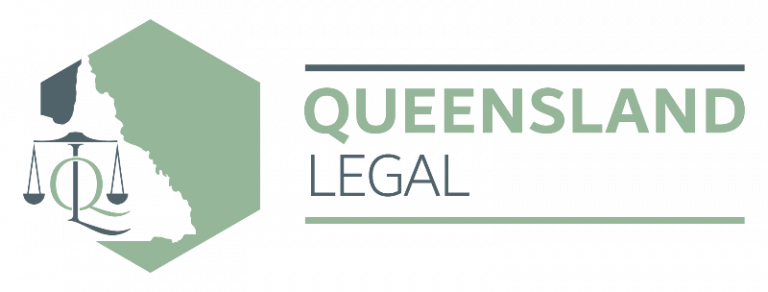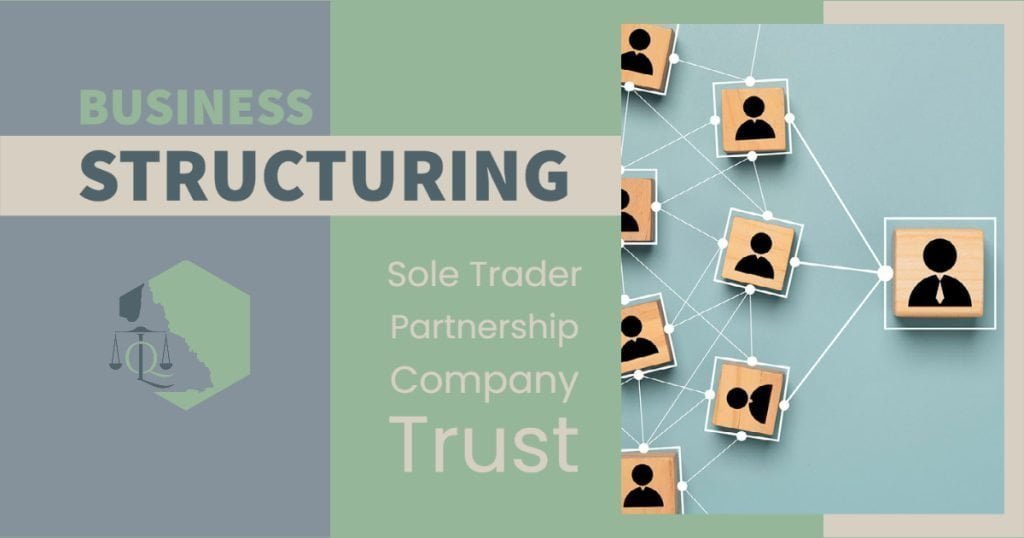
Solicitors Advice for SMSF Loan
Queensland Legal offers tailored legal advice for SMSF loan members, ensuring they understand the intricacies and obligations involved in being a guarantor. This service, vital
Legal Advice

Doing Things Differently but it's Business As Usual

Proper business structuring is paramount to ensuring that you get off on the right foot, and control the risks, obligations and burden of running a business.
Start off as a simple sole trader, and you might stifle future growth. Start off as a public company, and you might spend so much time in regulation and compliance that you can’t build your business.
Read about business start-ups in our dedicate page.
Striking a balance is important and setting up correctly for both current and future goals is important, effective and cost efficient.
We aim to get to know your business, and give legal advice and legal solutions that are practical, and will enhance your small business, as an investment into your future.
There is usually no need for us to meet with you in person. We can take instructions from you all remotely, so service the whole of Queensland.
However, we do have offices in Brisbane and on the Sunshine Coast, so if we need to, or if you prefer, we can meet in person too.
We can provide this type of advice within initial consultation with you, for a fixed fee.
A company structure means that your business is a separate legal entity from you. This means the company has the same rights as a natural person and can have debt, sue and be sued. A company is owned by its shareholders and run by its directors.
A company structure has higher costs and is more difficult to set up. Running a company can also be more expensive, because you have to meet reporting and other requirements under Australian company law. This is why the structure is generally considered to be better suited to medium to large businesses.
The personal assets of directors and shareholders are separate from the company, so they can’t be used to pay company debts. In certain cases where directors breach their duties, they may be held personally responsible for company losses.
The income and losses that the business makes belongs to the company, and is reported on a company tax return. The company tax rate(opens in new window) applies to the business income.
Tax File Number (TFN): A company needs its own TFN. The good news is you don’t need to register. The ATO will automatically issue a company with a TFN (if one doesn’t already exist).
If the company employs staff, the company is responsible for giving them their minimum employee entitlements and conditions (such as superannuation and leave).
Companies must appoint a public officer and let the Australian Taxation Office (ATO) know. Public officers are responsible for making sure the company complies with tax law, keeping tax records and submitting company tax returns. The ATO needs to know their details so they can contact them about company tax matters.
Proprietary limited company
Companies can be proprietary (private) or public. Most companies in Australia are proprietary limited. A proprietary limited company generally isn’t allowed to raise money from the public by selling shares (like public companies can).
They must have:
You can be both a shareholder and a director. You can also be the sole shareholder and director.
When companies are ‘limited’, the liability of shareholders is limited to any unpaid value (if any) on their shares.
This means that shareholders can only be responsible for company losses up to any amount unpaid on their shares.
Trusts are widely used for investment and business purposes.
A trustee is responsible for everything in the trust, including income and losses, and must report income in a trust income tax return.
A trustee can be an incorporated company or a person.
Profits from the trust go to beneficiaries.
Tax File Number (TFN): A trust needs its own TFN. The good news is you don’t need to register. The ATO will automatically issue a trust with a TFN (if one doesn’t already exist).
While in legal terms a trust is a relationship not a legal entity, trusts are treated as taxpayer entities for the purposes of tax administration.
The trustee is responsible for managing the trust’s tax affairs, including registering the trust in the tax system, lodging trust tax returns and paying some tax liabilities.
Beneficiaries (except some minors and non-residents) include their share of the trust’s net income as income in their own tax returns.
There are special rules for some types of trust including family trusts, deceased estates and super funds.
If you’re a sole trader, you’re an individual and the sole owner of the business.
The income your business makes belongs to you. You report the income on your individual tax return and pay tax on your business income at your individual income tax rate(opens in new window).
You’re responsible for all decisions and losses in your business. This means you have complete control over your business, but it also means your personal assets are at risk if things go wrong.
If you employ staff, you’re responsible for giving them their minimum employee entitlements and conditions (such as superannuation and leave).
This means all superannuation entities including:
Using a superannuation structure means that a business or businesslike activity (such as charitable, leasing or one-off transactions) is held and controlled by an individual or corporate trustee for the benefit of others (the beneficiaries).
The trustee is responsible for the trust, including income and losses. They must report income in a trust income tax return.
Applying for an ABN does not set up a superannuation fund!
The super fund must already have a trust with an appointed trustee.
It’s best to see a qualified, licensed professional to help you understand what’s involved and the registrations you’ll need.
In a partnership structure, you and your business partners own the business together and share the income and losses of the business. A partnership can have two or more partners.
You’re in a family partnership structure if two or more of the partners are related.
Each partner reports their share of the income on their own individual tax return, and pays tax at their individual income tax rate. The partnership must lodge a partnership income tax return every year with the Australian Taxation Office (ATO).
Tax File Number (TFN): A partnership needs its own TFN. The good news is you don’t need to register. The ATO will automatically issue a partnership with a TFN (if one doesn’t already exist).
All partners share legal responsibility for the business. This means the personal assets of all partners are at risk if things go wrong. If some partners want to limit their responsibility for business losses, you might want to consider a limited partnership structure.
If your business employs staff, all partners are responsible for giving staff their minimum employee entitlements and conditions (such as superannuation and leave).
DISCLAIMER: The content on this page was written at a specific point in time in the past and is provided as general guidance only. It is not intended to be specific legal advice to any person’s particular circumstances who may be reading it. We do not recommend you use this article as a replacement for obtaining proper legal advice on your issue and encourage anyone reading this content to obtain legal advice to ensure the above information and guidance remains valid and suits your particular circumstance. In our experience, there is no ‘one size fits all’ to any legal issue!
Why Choose Queensland Legal
Queensland Legal is proudly operated by Michael Turner, the Principal Lawyer and Solicitor.
My ambition extends beyond mere legal representation; I am committed to fostering enduring partnerships with my clients, built on a foundation of trust and mutual respect.
It is my objective to continually deliver exceptional value to your business, ensuring prosperity and growth for years to come.
Let Queensland Legal be your partner in navigating the complexities of the legal landscape, securing a successful future for your business.
Our Legal Services

Solicitors Advice for SMSF Loan
Queensland Legal offers tailored legal advice for SMSF loan members, ensuring they understand the intricacies and obligations involved in being a guarantor. This service, vital

Solicitors Advice for Reverse Mortgage
Queensland Legal offers legal advice for reverse mortgage borrowers across Australia, ensuring they understand the terms and implications of this unique equity release product. This

Legal Advice for Investment Property Loan Guarantors
Queensland Legal provides comprehensive legal advice for investment property loan guarantors, ensuring they understand their obligations and risks. Their service is designed to assist guarantors

Deed of Covenant & Assurance (QBCC)
Queensland Legal offers a critical service for QBCC guarantors needing a Deed of Covenant & Assurance, facilitating compliance with Queensland Building and Construction Commission requirements.
How To Contact Us
We are mostly an ‘online lawyer’ and utilise technology and digital processes to provide our style of lawyering. However, when we need to meet in person, we utilise some serviced offices that are within easy reach.
We service all of Queensland online, via phone, email and videoconferencing, such as zoom, skype and MS Teams. We can meet (by appointment) at our serviced office in Brisbane and on the Sunshine Coast.
Call Us
contact@queenslandlegal.com.au
Email Us
Email Us
PO Box 509 Mooloolaba
Queensland 4557
Write to Us
Open 9.00am to 4.30pm Mon to Fri.
Weekends/Evenings by Prior Appointment
14 Smith Street
Mooloolaba QLD 4557
WOTSO Serviced Office
Chermside Westfield Shopping Centre
Brisbane, Queensland 4032
Liability limited by a scheme approved under professional standards legislation.
Terms of Use | Privacy Policy | Copyright © | All Rights Reserved